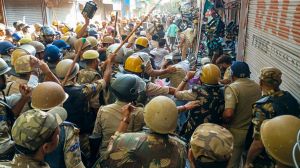Ecstatic Spanish fans celebrate Euro 2008 title
Joyous fans lit flares and waved Spain's red and yellow flag after a 1-0 victory over Germany in the European Championship.

Joyous fans lit flares and waved Spain’s red and yellow flag after a 1-0 victory over Germany in the European Championship final on Sunday ended a 44-year gap between major titles.
Fernando Torres sparked the celebration with his 33rd-minute goal and the 35,000 spectators packed into the public viewing area at Madrid’s Colon square continued in a frenzy until the final whistle.
Fireworks and car horns rang out across the Spanish capital after the final whistle blew. Spain, always a favorite at nearly every major tournament it plays at, had failed to match the expectations since lifting the 1964 European Championship, with a finals appearance in 1984 the only achievement since.
“Thanks for being with us – I hope you all get drunk tonight!” midfielder Cesc Fabregas screamed into the television sets of fans watching across the country.
Striker David Villa, the tournament’s leading scorer with four goals, told the watching crowds to prepare for Monday, when the team will arrive in Madrid to show off the trophy. The team is expected to arrive at Madrid Barajas airport at 7 p.m. local time (1700 GMT) before traveling to Colon square to display its prize.
Twenty-five people were hospitalized in Madrid with one person in critical condition with head injuries, news agency Efe reported. In all, emergency services treated 120 people.
Shortly after Spain’s victory, firefighters doused the crowds with water with the temperature nearing 30 degrees Celsius (86 degrees Fahrenheit) at Colon square and the party spilling into the streets of Madrid. Thousands made their way down to Plaza de Cibeles – the central plaza which normally plays host to Real Madrid’s Spanish league victories.
Similar scenes played out in viewing squares across the country – from Seville to Valencia to Murcia – and Spanish King Juan Carlos probably summed up all Spanish football fans’ patient wait for a major achievement best.
“We suffered, but in the end, it was worth the pain,” he told Cuatro TV channel.
Madrid’s elation was not matched in Barcelona, the northern Catalan regional capital, and in the Basque port city of Bilbao, where public screens were not erected due to sensitivity that comes with the country’s regionalism issues.
Both regions have long-term separatist issues that stem from a distant history when Spain was composed of autonomous kingdoms, differences which were exacerbated by political antagonisms which culminated in a 1936-39 civil war. Dictator Gen. Francisco Franco ruled Spain from the end of that war until his death in 1975 when King Juan Carlos led the country into the democratic country it is today.
Prime minister Jose Luis Zapatero Rodriguez reflected on the country’s achievement in political terms while also building up expectations for the 2010 World Cup in South Africa.
“It’s a privilege to be able to be here. I’m the first president of the democracy to live through such an achievement,” Zapatero said. “But this is only the beginning, there is more to come. The World Cup is next.”







- 01
- 02
- 03
- 04
- 05
























